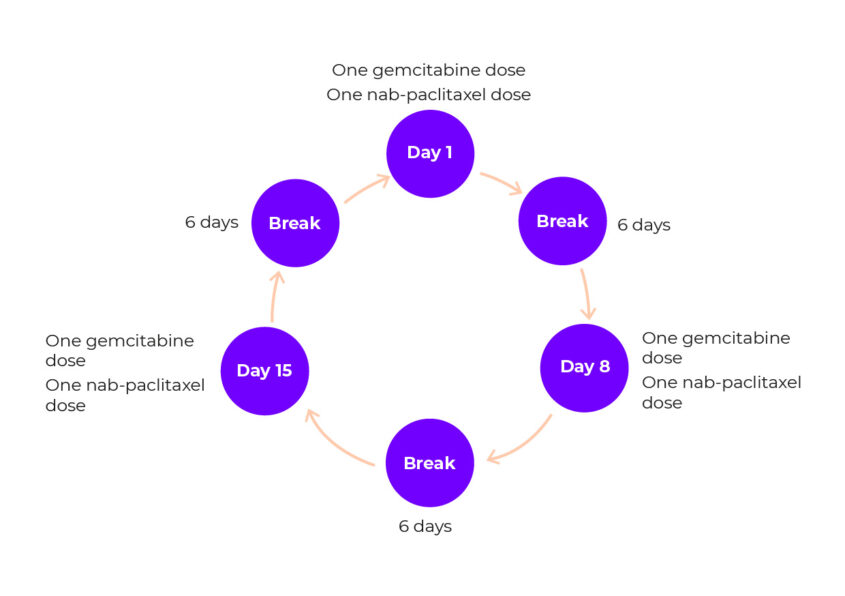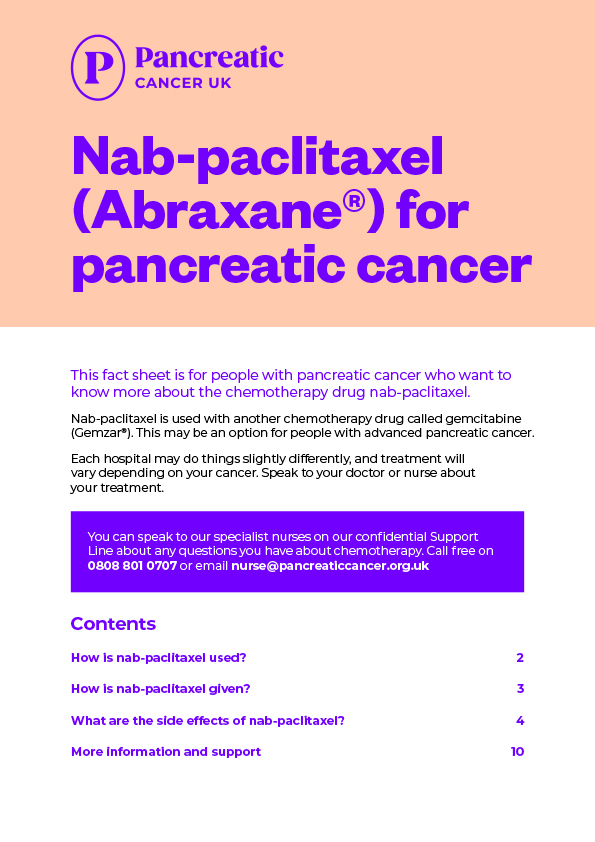Infection
Nab-paclitaxel can increase your risk of getting an infection. An infection is an emergency if you are having chemotherapy and needs to be treated straight away. Signs of an infection include:
- a high temperature – your chemotherapy team will tell you what to watch out for
- feeling shivery and cold
- headaches
- sore muscles
- a cough or sore throat
- pain or burning when you pee
- feeling generally unwell or tired.
Call the 24 hour emergency number your chemotherapy team will have given you if you have signs of an infection. You should phone if you have any of these symptoms or feel suddenly unwell, even if your temperature is normal or low.
Read more about infections and how they are treated.
Runny poo (diarrhoea)
If you have diarrhoea, try to drink as much water as you can manage. Call the 24 hour emergency number if you are finding it hard to drink enough fluids or have diarrhoea more than four times a day. They can give you medicines to control the diarrhoea, or they can lower the dose of nab-paclitaxel until it is better. We have tips on dealing with diarrhoea.
Constipation
You may also have constipation (when you find it harder to poo). Drink as much water as you can manage and try to eat foods that are high in fibre, such as fruit and vegetables. Speak to your doctor about medicines that can help. Gentle exercise may also help.
Fatigue (extreme tiredness)
Fatigue is a common side effect of nab-paclitaxel. It isn’t the same as feeling tired. Fatigue can make you feel weak and have problems concentrating. Some people find that the fatigue starts a few hours to a few days after having chemotherapy and starts to get better a few days later. See how the chemotherapy affects you and work out how much activity you can manage. There are things that can help with fatigue. Read our tips for coping with fatigue.
Nab-paclitaxel may also make you feel dizzy. Feeling tired and dizzy may affect your ability to drive. You might want to get someone else to drive you until you know if you are affected.
Feeling or being sick (nausea or vomiting)
This is a common side effect of nab-paclitaxel but you will be given anti-sickness medicines to stop you feeling or being sick. If these don’t help, call the emergency number. You may be able to change to a different medicine.
We have tips for coping with feeling and being sick.
Hair loss
Nab-paclitaxel may cause hair loss, but it should grow back once your treatment stops. Read more about hair loss and things that can help.
Tingling and numbness in your fingers and toes
Nab-paclitaxel can affect the nerves in your hands and feet, which can cause tingling and numbness (peripheral neuropathy). This normally gets better after your treatment. It can be worse in the cold, so wrap up warm if you are going outside. It’s important to tell your chemotherapy team about any tingling or numbness, so it does not become a long term problem.
Bruising and bleeding
Nab-paclitaxel can lower the number of platelets in your blood. This is called thrombocytopenia. You may bruise more easily than normal, and you may be more likely to have nosebleeds or bleeding gums. If you have a nosebleed that does not stop after five minutes, call the emergency number.
Appetite loss
During your treatment you may not feel like eating, and you may start to lose weight. Try eating small meals often. If your appetite doesn’t get better after a few days, tell your doctor or dietitian. We have tips on dealing with appetite loss.
Sore mouth and mouth ulcers
Nab-paclitaxel can make your mouth sore, or cause mouth ulcers which can be painful. Tell your chemotherapy team about any mouth problems you have. They can make sure you don’t have a mouth infection and give you a mouthwash to help. You should also tell them if you have white spots in your mouth. This is a sign of oral thrush, which is normally easy to treat.
Anaemia (low red blood cells)
Nab-paclitaxel can lower the number of red blood cells in your blood. This is called anaemia, and can make you feel tired, dizzy, or short of breath. If you have these symptoms, call the 24 hour emergency number. If your red blood cell level is very low, you may need to be given a blood transfusion through a drip.
Wheezing or feeling short of breath
Nab-paclitaxel can cause wheezing, a cough, a high temperature or shortness of breath. If this happens, call the 24 hour emergency number. You may need to have tests to check how your lungs are working.
Swelling (oedema)
Some people have swelling in their feet, ankles, legs, fingers or face. This is because of a build-up of fluid, which is called oedema. If you have swelling in your feet, it may help to have your legs up on a cushion when you are sitting down. Your doctor may also be able to give you medicines to help.
Joint and muscle pain
Nab-paclitaxel can cause problems with your joints, such as swelling or pain. Your muscles may also feel weak or stiff. You can take painkillers to help. Make sure that you check your temperature before taking any paracetamol or ibuprofen. If the painkillers don’t help or you have a high temperature, call the 24 hour emergency number straight away.


